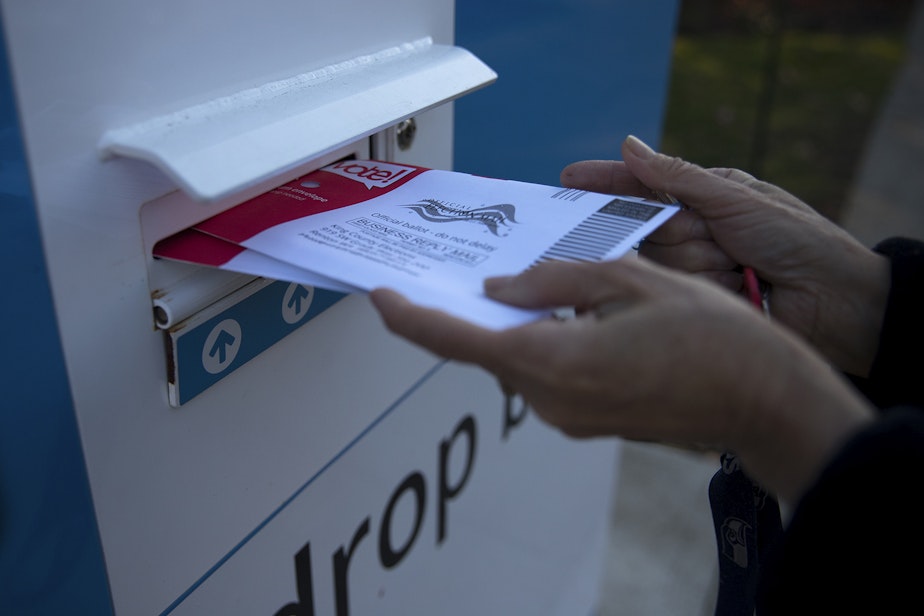Republican initiatives you’ll be voting on in Washington state

Six initiatives backed by Washington state Republicans could be on their way to voters’ ballots in 2024.
“These initiatives would significantly change the policies laid out in Washington right now and the state’s trajectory on things like climate change,” Northwest News Network reporter Jeanie Lindsay told Seattle Now.
Hit the play button above to hear Jeanie Lindsay’s full conversation with Seattle Now host Patricia Murphy, and keep reading for key take-aways
The initiatives are the work of a number of high-profile Washington Republicans. They were filed with the Secretary of State’s office by Jim Walsh, a lawmaker representing Aberdeen in the House of Representatives and Washington State Republican Party Chair. The group Let’s Go Washington, backed by Republican mega-donor Brian Heywood, funded the process of collecting signatures needed to advance the initiatives to the state Legislature.
The group gathered more than 320,000 signatures from Washington voters for each initiative. Three have already been verified by the Secretary of State’s Office. The next stop is the state Legislature, where lawmakers have the option to respond before sending them to voters.
Two of the initiatives would repeal part or all of landmark Washington laws passed by the Democratic supermajority in the Legislature over the past three years: The Climate Commitment Act and Washington’s Capital Gains Tax.
The Climate Commitment Act created Washington’s carbon emission auction, where companies operating in the state bid for credits that allow them to release carbon pollution. The law reduces the number of credits available each year to reduce carbon emissions in the state.
In its first year, the program brought in $1.8 billion. That money goes towards climate projects including low-emission transportation, clean energy jobs and habitat restoration. Critics of the law say it has contributed to Washington’s high gas prices in the time since it went into effect.
Initiative 2117 would ban the state from enacting any cap and trade program and repeal sections of the Climate Commitment Act.
The state’s capital gains tax is the target of Initiative 2109, which would entirely repeal the law. It taxes money made by individuals on the sale of long-term assets (like stocks and bonds) over $250,000. In 2022, roughly 3,800 households met the requirements to pay the tax. It brought in $900 million in revenue.
“State law says the money from the capital gains tax goes to school construction, and then it goes into a state funding account specifically for education, including early learning and childcare,” Lindsay said. “So it's a pretty significant chunk of change that the state would no longer have access to, if the capital gains tax is taken away.”
The other four: Parents’ bill of rights, police, payroll and income taxes
Initiative 2081 would create a so-called "parents' bill of rights," outlining parents' authority over their children’s schooling. It would allow parents to request academic, medical and mental health records from schools, some of which are currently shielded by privacy laws.
Initiative 2113 would roll back restrictions on when law enforcement officers can engage in car pursuits, an issue the legislature has revisited several times in recent years.
Initiative 2124 would allow residents to opt out of the state’s 0.58% long-term care payroll tax enacted in 2022. It funds benefits for people in the state who need in-home or residential medical care.
And Initiative 2111 would ban income taxes in Washington, something already illegal according to courts’ interpretations of the state’s constitution.
Before the initiatives move onto voter ballots this November, lawmakers in Olympia have a chance to respond.
Lawmakers’ first option is to accept the initiatives and enact them as written.
“That isn't going to happen,” Lindsay said. “These proposals [are targeting] democratic priorities, so the Legislature is not going to adopt these.”
But lawmakers could add an alternative option to the ballot, giving voters the choice to reject a proposal, accept a proposal, or vote for an alternative presented by lawmakers. Regardless, Washington voters will be the ones making a final decision in November.






